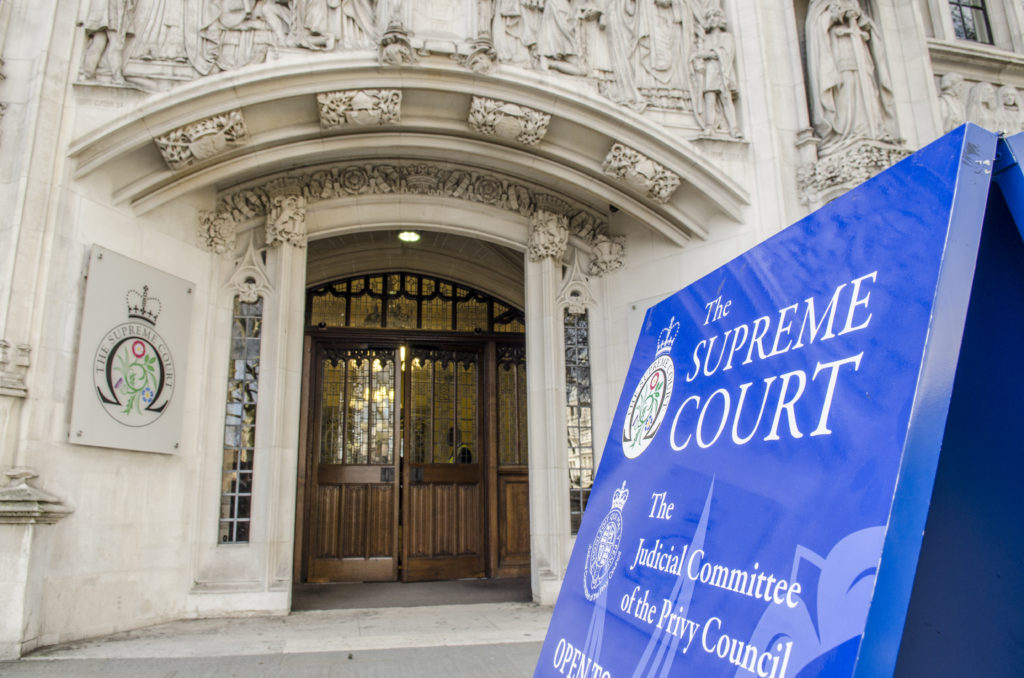Standing outside the Supreme Court on Wednesday 21st June, Sarah Finch discussed the beginning of a hearing that could have profound consequences for fossil fuel extraction in the UK. Leading Weald Action Group, Finch has challenged Surrey County Council’s decision to grant planning permission on an oil drilling project that could see up to 3 million tonnes of crude oil extracted following expansions to the Horse Hill oil field.
The legal challenge relates to an interpretation of planning rules. If a project is likely to have a significant impact on the environment, an environmental impact assessment is required as part of the application for planning permission. The environmental impact assessment for the expansion of the Horse Hill oil field took into account the immediate environmental impact of drilling activities.
However, Finch has argued that this assessment should have also taken into account the future emissions from burning the extracted oil, known as the downstream impact. For 3 million tonnes of crude oil, it has been estimated that this downstream impact would be in the region of 10 million tonnes of CO2. For comparison, that is equivalent to almost 2 million UK residents’ average annual carbon footprint.
Considering the potentially far-reaching consequences of the case, it has drawn attention both from environmental campaigners and organisations within the fossil fuel industry. In some instances in a judicial review, courts may allow ‘interveners’ to file evidence for either party if it is relevant to the case. Three environmental groups have intervened supporting the claim. West Cumbria Mining, which has recently received planning permission for a controversial mine in north-west England have intervened challenging the claim.
Tackling environmental issues through strategic litigation, this case is reflective of a global movement that has grown exponentially in recent years. LSE’s Grantham Research Institute on Climate Change and the Environment reported in 2022 that climate litigation has doubled since 2015. The report also found that over 50% of the climate litigation cases filed outside the US resulted in an outcome that was considered favourable for climate action.
The increased volume and effectiveness of these cases make climate litigation impossible for corporations to ignore. Climate litigation risk is now a very real factor for businesses across a wide range of sectors. With uncertainty around the direction courts will go in many climate cases, energy companies must weigh the risk of continued reliance on fossil fuels.
Litigation funders are also taking note of the growth in this area. Funders are third-party organisations that provide legal funding for claims in exchange for a percentage of the financial award if successful. A new funder Aristata Capital recently raised £30mn to fund cases in human rights and environmental litigation. An example of the impact of funding in climate action was seen in the 2022 settlement of a lawsuit funded by Harbour Litigation. Energy company PTTEP Australasia paid over £100mn to around 15,000 Indonesian farmers after an oil leak caused irreparable damage to their crops.
Separately, an increasing number of cases brought by non-profit organisations also directly challenge government policy. In 2019, the nonprofit group Urgenda achieved a ruling in the Dutch Supreme Court that the country’s plans to combat emissions were not sufficient. In 2020, environmentalists achieved similar improved commitments in Germany’s constitutional court and Last year, the high court ruled in favour of Client Earth that the UK government’s net zero strategy was inadequate.
Pundits have drawn parallels to the approach taken to combat the tobacco industry in the mid-late 20th Century: a damning scientific consensus, powerful corporate lobby groups and a legal landscape that is shifting to favour campaigners. Alongside scientific research and political campaigning, litigation played a central role in the increasingly restrictive legal framework around the tobacco industry. In America, the Tobacco Master Settlement Agreement resulted in the dissolution of several powerful tobacco industry groups alongside financial damages.
It is clear that courtrooms could play a similarly central role in the fight against climate change. Campaigners have already achieved successful outcomes securing improved commitments from both public bodies and private organisations. Perhaps the most significant outcome was achieved in the Hague in 2021. The court ordered Shell, the world’s fourth-largest energy company, to reduce its global emissions by 45% by 2030. This included not only emissions from drilling but also the downstream impact of its products.
Despite the smaller scale, many of the same arguments underpin the Surrey oil case heard in the Supreme Court last week. The case reflects a growing number of climate campaigners directly challenging decisions they view as unacceptable. Like many other ongoing climate cases in courts internationally, both campaigners and businesses will be closely watching a decision that could be pivotal in UK environmental law.














